Where to Go to See the Grand Canyon
16 Top Attractions & Things to Do at the Grand Canyon
We may earn a commission from affiliate links ()
The Grand Canyon is one of America's most famous and awe-inspiring natural attractions and has been a road-tripping destination for generations.
The North Rim and South Rim are accessed from opposite sides of the canyon, but most people visit the Grand Canyon National Park's South Rim. The North Rim is closed in winter, but the South Rim and West Rim are open year-round and easily accessible from tourist destinations like Las Vegas, Phoenix, Sedona, and Williams.
The attractions listed below are all found on the South Rim, with the exception of the Skywalk at Eagle Point, which is located at the West Rim.
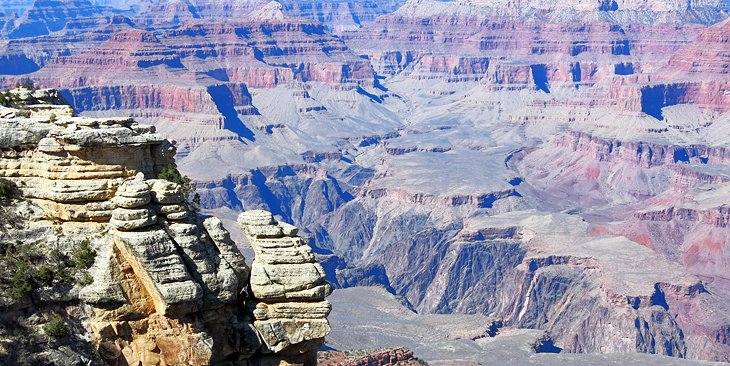
The main access point for the South Rim is the South Entrance, where the main visitor center is located. It is also possible to enter via the east, at the Desert View Entrance, but for most people, this is a less convenient option.
From the South Entrance Visitor Center, you have two main options for exploring the park by road: Hermit Road runs west, past the small resort area of Grand Canyon Village, more commonly known as the Village, to numerous overlooks. This road is open to private vehicles from December 1 to the end of February, but outside of these dates you must use the park shuttle buses.
The other option, open to cars at any time of year, is the Desert View Drive, which heads east from the Visitor Center for 22 miles to the Desert View Watchtower. Both of these drives are fantastic and provide different perspectives of the canyon.
A variety of tours offer exceptional ways to experience the Grand Canyon, from helicopter rides to white water rafting. Some of these start right at the Grand Canyon, others depart from nearby cities, such as Las Vegas.
Deciding in advance when to visit and what to see once you get here can help maximize your time and make your visit more relaxing and fun.
Accommodation is available in the national park at the Village, and is operated by a concessioner of the park. Just outside the South Entrance is the small town of Tusayan, with a much larger variety of chain hotels, as well as restaurants and other services.
Note: Some businesses may be temporarily closed due to recent global health and safety issues.
On This Page:
- Grand Canyon South Rim Attractions
- Grand Canyon West Rim Attractions
- Grand Canyon Tours
- Where to Stay at the Grand Canyon
Grand Canyon South Rim Attractions
1. Visitor Center & Mather Point Overlook
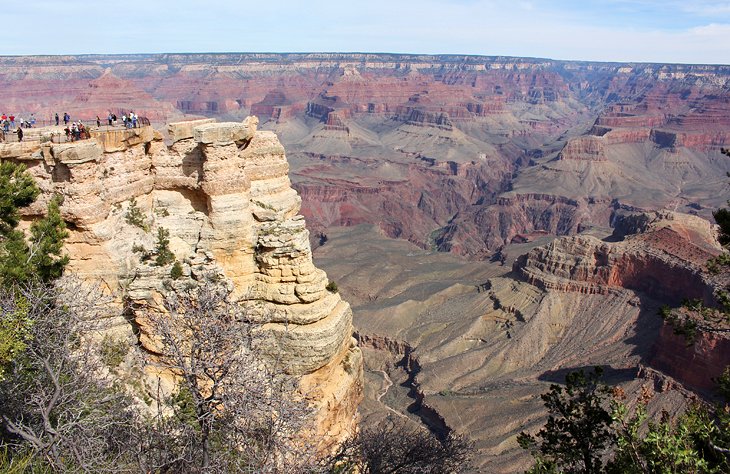
If you are entering the park at the South Entrance, from the direction of Williams, the best thing to do is head directly to the visitor center. A few displays show a brief overview of the park and a little about the history. The park staff are on hand to answer questions and provide information on hiking trails and attractions.
From the visitor center, a short path leads to Mather Point Overlook, where there are a couple of large viewing areas on a peninsula jutting out into the canyon, with great vistas over the canyon.
2. Rim Trail
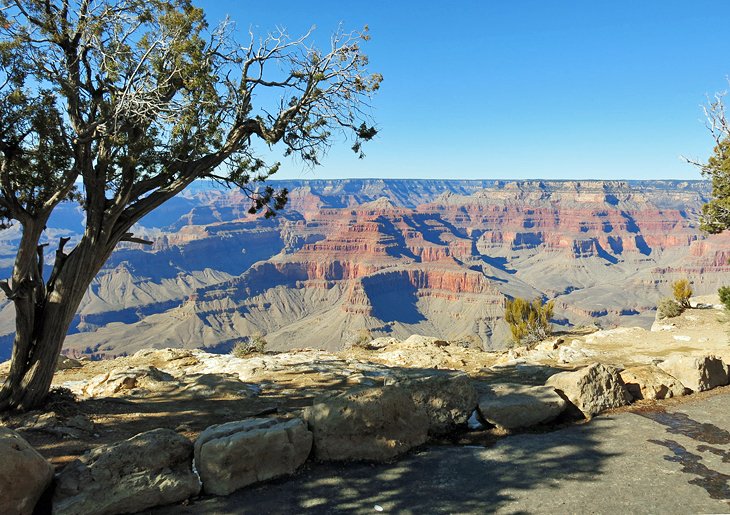
The Rim Trail is a mostly paved walking path that follows the rim of the Grand Canyon for 13 miles. It runs from South Kaibab Trailhead, east of the Visitor Center, to Hermit's Rest, at the far west end of Hermit Road.
This nearly level path, with a mix of sun and shade from scattered trees, is one of the most scenic walks in North America, with fabulous views along the entire distance of the trail.
You can access it in front of the visitor center at Mather Point, in the Village, or from any of the scenic stops along Hermit Road. If you have limited time and are only interested in a short walk, a good option is the section from Mather Point, heading west to Yavapai Point and the Geology Museum.
3. Geological Museum
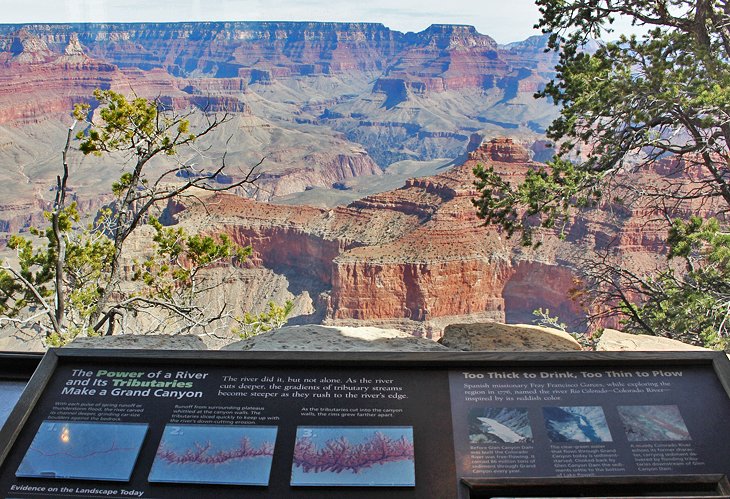
One of the most interesting and informative exhibits in Grand Canyon National Park is the Geological Museum. The location for this museum was chosen by a group of high profile geologists in the 1920s because the views from here were the most representative of the geology of the canyon.
The museum describes in detail the layers of rock visible as you look out the long wall of windows. Huge diagrams describe the formation of the canyon, from the uplifting of the rocks to the erosive power of the water running through the canyon far below.
From the windows, you can see the hiking trails below, including a great view of the route out to Plateau Point, an offshoot of the Bright Angel Trail, and a side path leading down to the Colorado River.
4. Hermit Road Drive
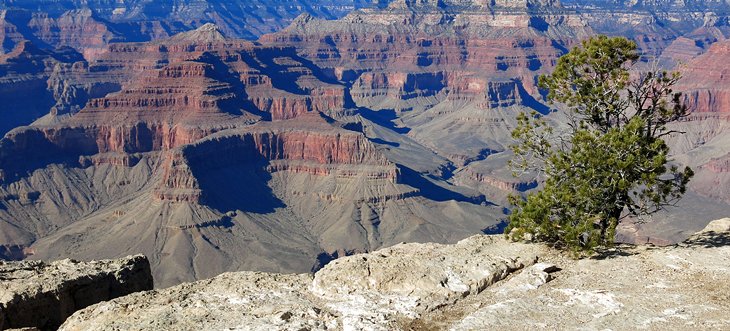
Hermit Road is a seven-mile scenic drive along the canyon rim, with numerous viewpoints. This is the most popular route in the park.
If you are visiting between the beginning of December and the end of February, you can do this drive in your own vehicle. From March 1 to November 30 you must use the park shuttle buses, which operate every 10 to 15 minutes and stop at nine overlooks.
All the overlooks along this route offer incredible vantage points over the canyon. Although it may be the source of some debate, some of the best views can be had from Maricopa Point, Hopi Point, The Abyss, and Pima Point. If you are short on time, you may want to skip the last stop, Hermit's Rest.
5. Bright Angel Hiking Trail
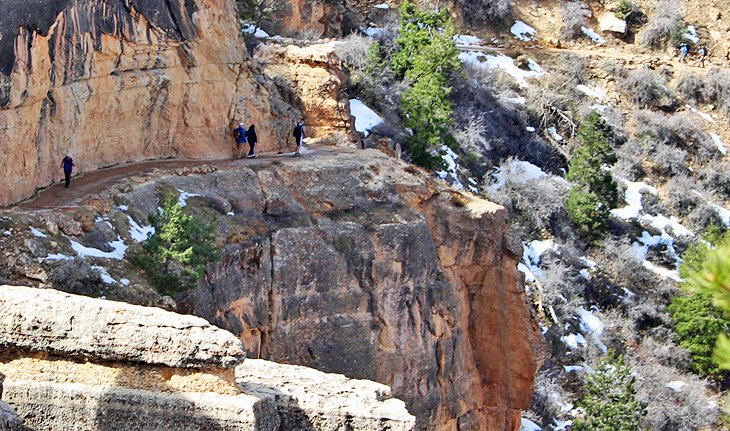
The most popular hike in the park is the Bright Angel Hike, which departs from the Village, where the shuttle bus to Hermit's Rest begins its route. This is a long hike, but many people choose to walk down the trail only a short distance to get a feel for the hike. The complete route, round-trip to Bright Angel Campground, is 19 miles and takes two days.
Many serious hikers choose to go to Indian Garden Campground, which is a nine-mile round-trip hike, and takes between six and nine hours. Keep in mind, this includes a strenuous hike with more than 3,000 feet of elevation change.
For a short sample of the trail, the Upper Tunnel is only 0.4 miles round-trip and takes less than 30 minutes, and the lower tunnel is 1.7 miles and takes between one and two hours. This hike hugs the canyon walls, with steep cliffs and sharp drops off the outer portion of the trail. It is not suited for anyone with a serious fear of heights. Some portions of the trail are in shadow and may be snow or ice-covered, even when conditions at the top are warm and dry.
6. Desert View Drive
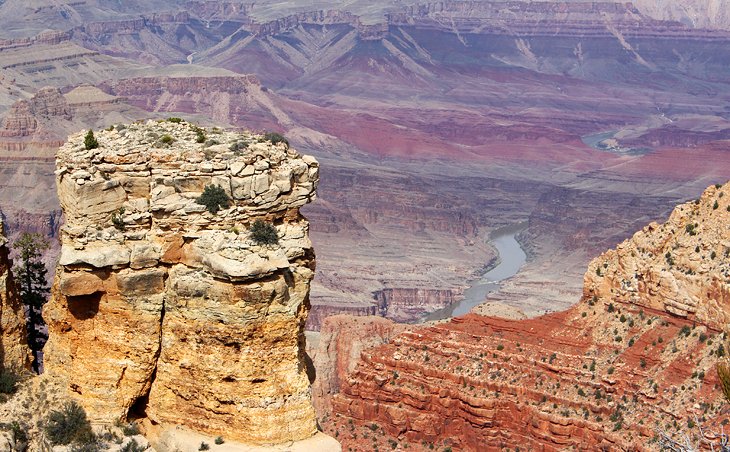
While most people tend to gravitate towards Hermit Road, the 22-mile Desert View Drive is equally, if not more stunning. One of the main differences is the view to the Colorado River, which is much more visible from some of the stops along this drive than on the route further west. Here, you can see white water rapids, and long, wide sections of the river snaking through the canyon in the distance.
There are fewer stops along this route, but they are all worth taking the time to enjoy the lookouts. Moran Point is definitely a highlight, with a beautiful view over the Colorado River from the far east side of the parking area and a myriad of different colors visible in the rock walls across the canyon.
Lipan Point has more wonderful views to the Colorado but is also a noteworthy location for birders. This is the most direct route across the canyon for migrating birds, which use this more narrow section on their flight path.
Grandview Point is one of the highest lookouts on the South Rim. From the viewing area, the Grandview Hiking Trail leads down in a steep descent, quickly disappearing out of sight. This is a strenuous hike on an unmaintained trail and best suited for serious hikers. The trail conditions here are more difficult than Bright Angel; slippery in the spring and hot in the summer.
From Navajo Point, the last stop before Desert View Watchtower, the watchtower is visible off to the right, and can be a good photo opportunity if you have a long lens. The last stop is Desert View, with the watchtower standing proudly on the cliff edge, and it is definitely a highlight on this drive.
Also found along Desert View Drive is the Tusayan Museum and Ruin. The museum itself is quite small, with information on the people who inhabited this area and a short trail leading through the ruins offering a close-up look at the dwellings.
7. Desert View Watchtower
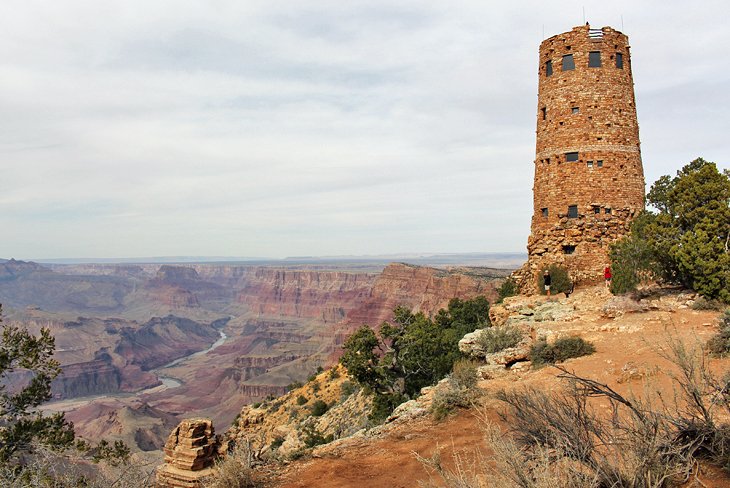
Desert View is the first stop in the park if you are coming from the east and entering the park through the Desert View Entrance. This is a full-service stop with a general store, trading post, and camping, but the main attraction is the famous Indian Watchtower.
Despite its appearance, the 70-foot tower is not an ancient, crumbling stone ruin. It was built in 1932 and is one of four structures in the park designed by Mary Jane Colter, all of which are on the National Register of Historic Places.
The structure is designed to look like an Anasazi watchtower, and much attention was given to detail in its creation. The tower is built around a concrete and steel structure, but the stone exterior, with uneven rooflines, creates a dramatic effect, as it blends in with the surrounding colors. The interior walls, visible on every level from the circular balconies and stairways, are covered with what is meant to look like petroglyphs and ancient artwork.
There is an outdoor observation deck on the second level and an enclosed observation deck on the top floor, with incredible views out over the canyon and beyond to the desert on the east side.
8. Lookout Studio and the Kolb Gallery
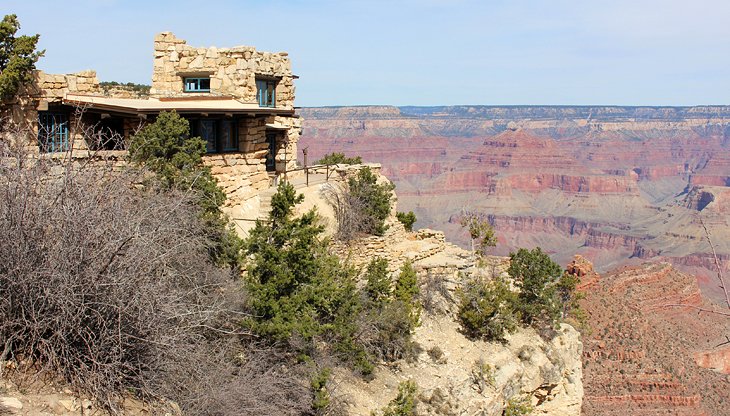
In the Village, the Lookout Studio and the Kolb Gallery are both perched along the canyon wall. The Lookout Studio is housed in one of the Mary Jane Colter Buildings that are found throughout the park, with a traditional stone design, meant to resemble a ruin. The Studio sells souvenirs and trinkets but also has two outdoor viewing decks that look out over the Grand Canyon.
Just a short walk to the west of here is the Kolb Gallery, in a dark brown, wooden structure. This historic Victorian home was built in 1905 and belonged to the Kolb brothers, who were early adventurers in the park. Today, the building serves as an art gallery, with changing exhibits, a small store selling books, and information on the life of the Kolbs. The Kolb Gallery is near the start of the Bright Angel Trail.
9. Wildlife Viewing
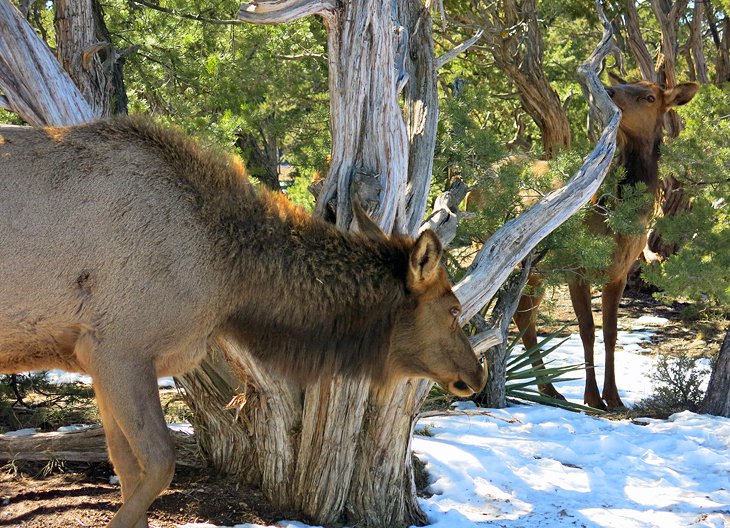
While most people don't come to the Grand Canyon for the wildlife viewing, it's more than likely you will see at least some animals if you are driving through the park. One of the usual suspects that can often be spotted along the Rim Trail is elk.
Although you are less likely to see them, mountain lions live in the park forests, and signs along the Desert View Drive advise drivers to watch for them on the road. Also found in the park are bighorn sheep; hog-nosed skunk; mule deer; Arizona's state mammal, the ringtail; and many other smaller critters, including the Kaibab squirrel.
10. IMAX Movie at the National Geographic Visitor Center
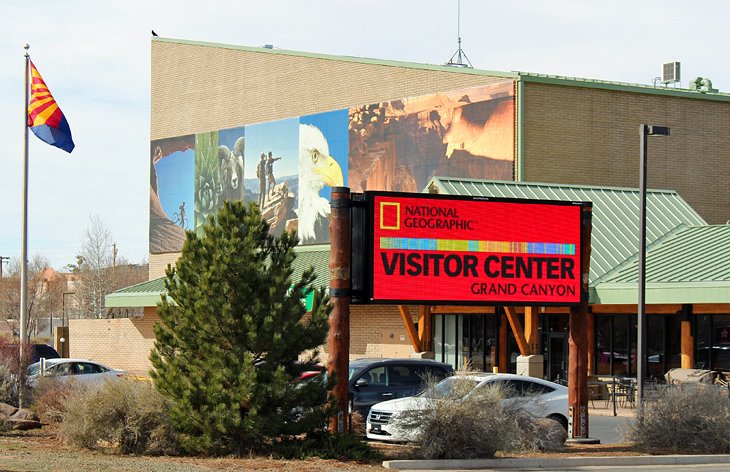
In the town of Tusayan, just outside the South Entrance to Grand Canyon National Park, is one of the oldest IMAX Theaters in existence, and seeing a movie here has been a long standing tradition for families coming to the canyon.
The movie, Grand Canyon: The Movie (Grand Canyon: The Hidden Secrets), one of the longest running IMAX movies to be shown in the same location, is a 34-minute film and begins on the half hour. In addition to seeing the film, visitors can also get information on the park or grab a bite to eat at the on-site café.
11. Nearby: Little Colorado River Overlook
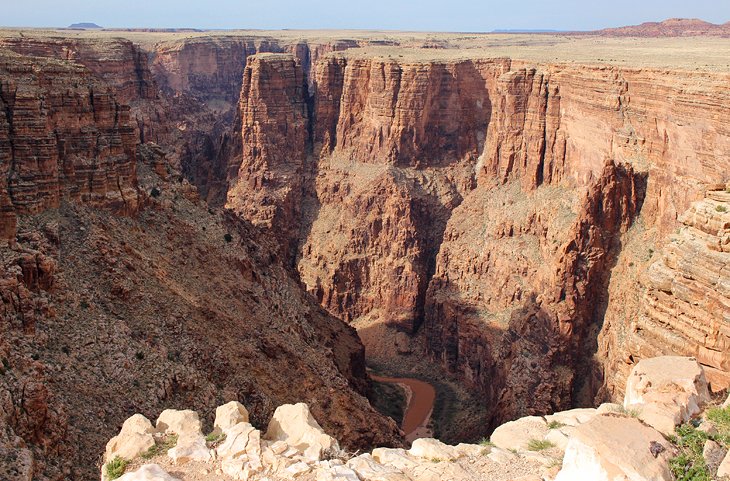
Leaving Grand Canyon National Park via the east side of the South Rim, through the Desert View entrance, the first sign-posted scenic lookout offers an incredible view over the Little Colorado River. This stop is on Navajo land, and in the parking area, Navajo artists sell handmade jewelry.
A short stroll along a wide trail beyond the parking lot leads to two picnic tables and a lookout area (with railings) with direct views over a portion of the gorge. From the edge, the Little Colorado River is visible far below.
Grand Canyon West Rim Attractions
12. Skywalk & Eagle Point
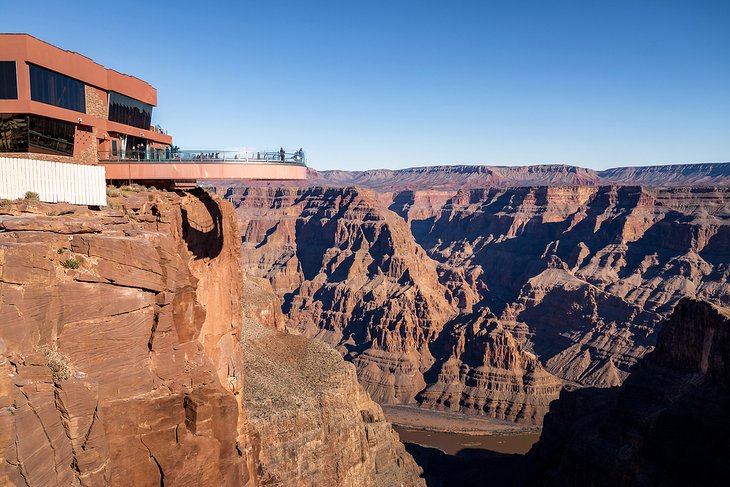
If you've seen pictures of the glass bridge jutting out over the Grand Canyon and have your heart set on this experience, Eagle Point, at the West Rim, you can reach it in about a four-hour drive from the South Rim. This horseshoe-shape glass walkway extends out 70 feet over the canyon, allowing you to peer straight down.
You can also dine at the Sky View restaurant and look out over the Skywalk. Other things to do here include watching Native American dancing and visiting the Native American Village.
Grand Canyon Tours
13. Helicopter Flight over the Grand Canyon
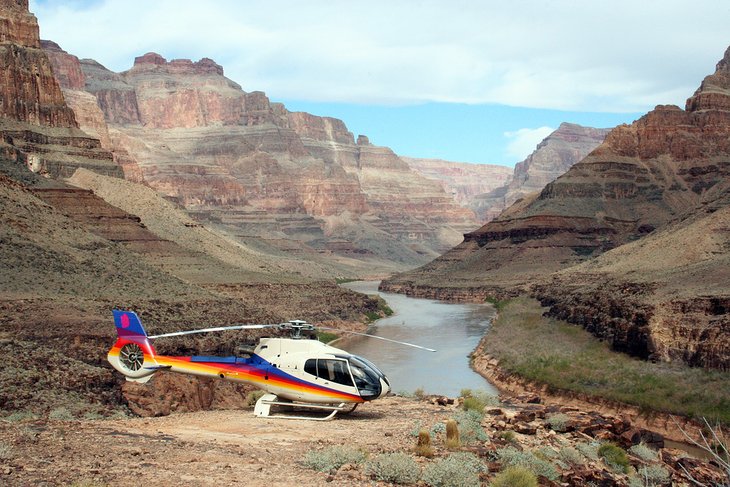
If you want to fully appreciate the grandeur of the Grand Canyon, take a 25-minute Grand Canyon Helicopter Tour and soar out over the abyss to get a bird's-eye view. These tours leave from the Grand Canyon Airport in Tusayan, less than a 10-minute drive from the South Entrance of the park. This flight takes you out over the Dragon Corridor, the widest and deepest section of the canyon, and several other key attractions.
14. Grand Canyon Railway Adventure from Sedona
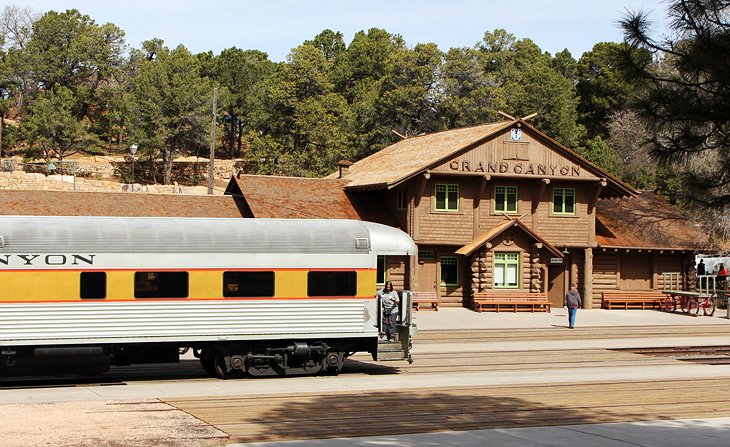
You can combine a luxury train ride through the desert with sightseeing at the Grand Canyon on a full-day Grand Canyon Railroad Excursion from Sedona .
This tour offers pickup from your hotel in Sedona and takes you to the train station in Williams. The train then travels through the Arizona high country to the South Rim of the Grand Canyon, where you then have free time to explore and a guided rim tour.
This is one of the easiest ways to see the Grand Canyon, with no driving or parking hassles.
If you have time to spare, you can enjoy a bit of sightseeing in Sedona or Williams.
15. Grand Canyon White Water Rafting Trip from Las Vegas
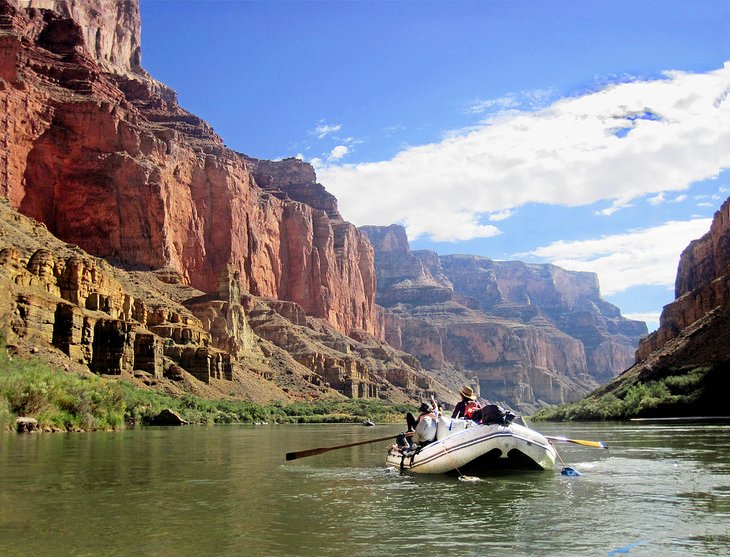
Raft 40 miles of the Colorado River on a one-day Grand Canyon White Water Rafting Trip leaving from Las Vegas. This is a 15-hour trip leaving at 4am, with hotel pickup and drop off, a van ride and short helicopter flight to the Colorado River, a full day of white water rafting through the Grand Canyon, and a return trip to Las Vegas.
16. South Rim Mule Rides
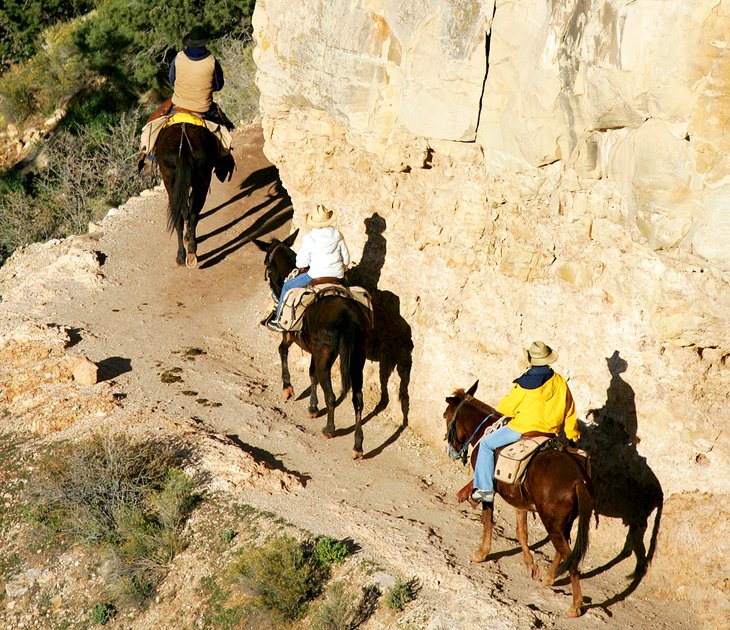
If you are interested in heading down into the Grand Canyon but are not up for the hike, mule rides are offered year-round from the South Rim. The mules carry guests down the Bright Angel Trail on a 5.5-hour trip for an overnight stay at Phantom Ranch and then return the next day. http://www.grandcanyonlodges.com/things-to-do/mule-trips/
Where to Stay at the Grand Canyon
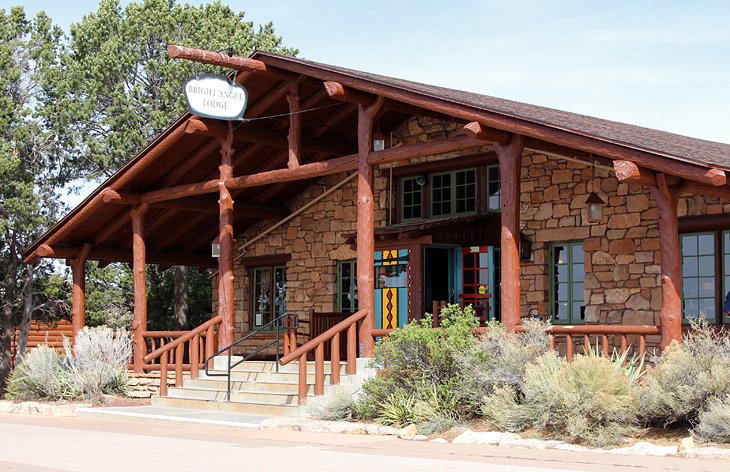
There are four lodges at the Village in Grand Canyon National Park, and these can only be booked through the concessioner of the park. All other accommodation near the South Entrance is in the town of Tusayan, a five-minute drive from the park gate. Here, there are a variety of hotel options, along with restaurants that range from fast-food chains to upper-end dining. Below are some highly-rated hotel options in Tusayan:
- Renovated top to bottom in 2016, the luxurious Grand Hotel at the Grand Canyon offers well-appointed rooms with a rustic charm.
- The Holiday Inn Express is also newly renovated, with large rooms complete with microwaves and fridges. A breakfast buffet is included in the room rate.
- The only hotel in Tusayan that accepts pets (fee applies) is the Red Feather Lodge . This property consists of two buildings; one is a motel style with drive-up rooms, and the other is a traditional hotel with interior corridors. A complimentary park shuttle is available to guests mid-May through mid-September.
- Also offering a free shuttle is the Canyon Plaza Resort , with oversized rooms and an on-site restaurant.
All these hotels offer seasonal, outdoor pools and lie within close proximity to each other and within easy walking distance to restaurants. For a more comprehensive look at hotels see our complete guide to the best hotels at the Grand Canyon.
Where to Go to See the Grand Canyon
Source: https://www.planetware.com/canyon-country/grand-canyon-national-park-us-az-gcnp.htm
0 Response to "Where to Go to See the Grand Canyon"
Post a Comment